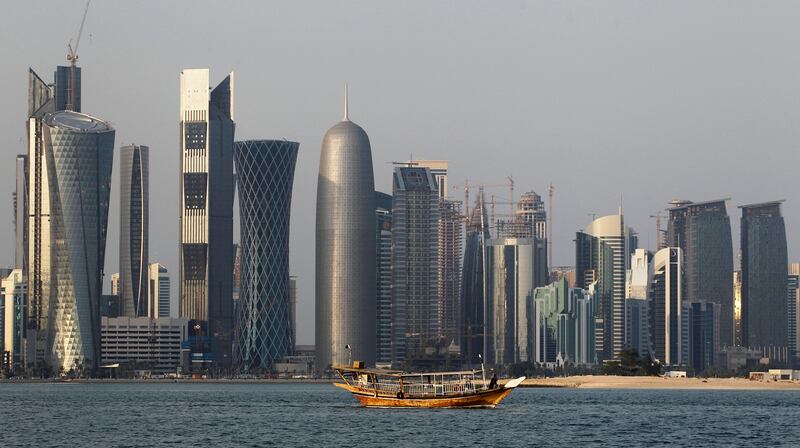The Qatari emir will send a message to Kuwait’s ruler on Monday morning regarding his country’s stance on the 13 demands made by its neighbours.
Qatari media said that the message will be delivered by the Qatari foreign minister, Sheikh Mohammed bin Abdulrahman Al Thani, to Sheikh Sabah Al Ahmed Al Sabah, who has returned from a trip to India.
The foreign ministers of the Arab countries that made the demands will meet on Wednesday in Cairo to discuss the next steps with Qatar, according to Ahmed Abu Zeid, spokesperson for Egypt's Ministry of Foreign Affairs.
Qatar faced the prospect of further sanctions and possible expulsion from the GCC on Sunday as a deadline loomed to meet demands by neighbours who say it must end policies that support terrorism and endanger their security.
Qatar's foreign minister on Saturday rejected the 13 demands issued by Saudi Arabia, the UAE, Bahrain and Egypt on June 22 but there was no direct response from the countries as the clock ran down on their 10-day ultimatum for action.
Bahrain’s foreign minister, Sheikh Khalid bin Ahmed Al Khalifa, discussed the standoff with Qatar in a phone call with US Secretary of State Rex Tillerson on Sunday evening, reported Bahrain’s news agency.
Foreign minister Sheikh Mohammed Al Thani said the conditions laid down for normalisation of ties infringed on Qatar's sovereignty. However the Saudi envoy to the UN said on Sunday that Doha had reneged promises to change its ways in the past, when it was taken at its word.
“Qatar has been given several chances to end its support of terrorism and stop its meddling in countries’ domestic affairs. This was done in 2013 and 2014 but these attempts failed as it did not commit to the demands asked of it,” Abdullah Al Mouallimi said.
“The Kingdom, UAE, Bahrain and Egypt took the decision to sever ties with Qatar to ensure security in the region and pressure Doha to put an end to its funding of terrorism. Qatar has chosen Iran as an ally. It has supported terrorist groups for 20 years despite knowing that it destabilises the region.”
The four countries cut diplomatic, trade and travel links with Doha on June 5, sparking the worst diplomatic crisis to hit the region in decades. They accused Doha of supporting extremism and of being too close to regional arch-rival Iran, which Qatar has strongly denied.
Doha has said it was willing to negotiate on the demands, which include scaling back ties with Iran, closing down the Al Jazeera news network, shutting a permanent Turkish military base in Qatar and cutting ties with terrorist organisations. Saudi Arabia has said the demands are non-negotiable.
Kuwait, a fellow GCC member of Qatar, Saudi Arabia, the UAE and Bahrain, has tried to mediate a solution to the crisis, as has the United States, a key ally of all parties to the dispute, but with little success.
The UAE ambassador to Russia, Omar Saif Ghobash, has said economic sanctions were being considered if Qatar failed to address its neighbours' concerns.
"Their position today anyway is inconsistent with being members of the GCC because it is a common security and defence organisation. There are certain economic sanctions that we can take which are being considered right now," he told Britain's Guardian newspaper last week. he Qatatri foreign minister, Sheikh Mohammed bin AbdulRahman Al Thani, said last night that his country will reject the 13 demands made on June 22.
"This list of demands is to be rejected, not to be accepted. We are willing to engage in dialogue but under proper conditions," he said in Rome on Saturday.
The list includes shutting down Al Jazeera news network, scaling down Qatar's relations with Iran and agreeing to monthly audits on government finances.
"If countries are looking to close down Al Jazeera, then they should start a news organization that can rival it," he said in a press conference in Rome yesterday, "for us, it is a source of pride."
In the hour leading up to the announcement yesterday, Russian President Vladimir Putin spoke over the phone with Sheikh Hamad Al Khalifa, King of Bahrain, before phoning Doha to speak with Emir Tamim Al Thani.
Qatar last week met with President Reccip Tayep Erdogan who announced plans of intensify troop deployment on a Turkish base in Qatar, days after the Arab states sever ties.
The Arab states listed among their 13 demands that Qatar immediately shut down the Turkish base in the country.
Mr Erdogan said, however, that he remains hopeful that a diplomatic solution can be reached.
The crisis began early June when the four Arab countries boycotted Qatar and retracted diplomatic ties over accusations that Doha has destabilized the region by funding terrorism in Arab states.
Dr Anwar Gargash, Minister of State for Foreign Affairs, has played down the chances of enhanced measures or military escalation against Qatar. He said "the alternative is not escalation but parting ways", suggesting Qatar may be forced out of the six-member GCC, which also includes Oman.
Officials throughout the UAE have voiced their opinion on the matter:
Dhahi Khalfan Tamim, lieutenant general and head of security for Dubai, said he expected a change in leadership within three to six months.
“The Qatari people will appoint a new leader naturally, especially considering the conditions of the current leadership flop,” he said on Twitter.
* with reporting from Reuters





